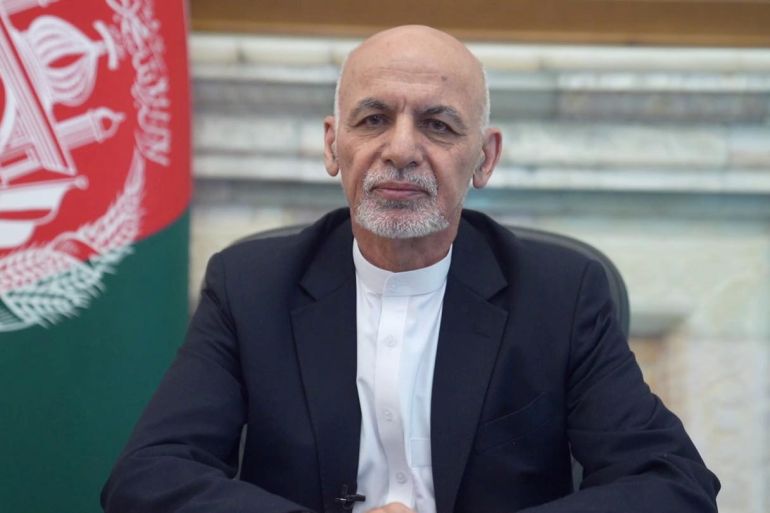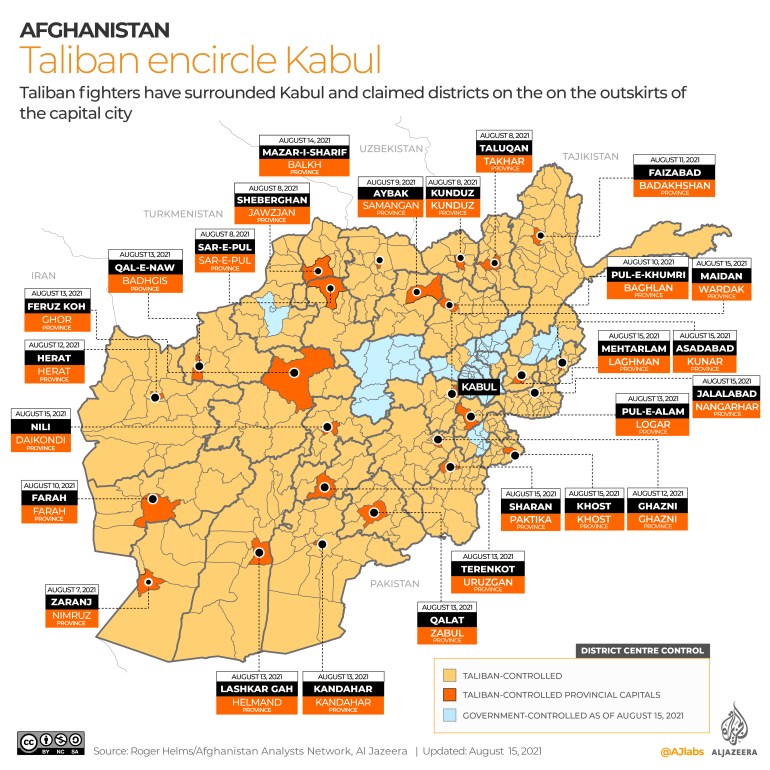Afghan President Ghani flees country as Taliban enters Kabul
Taliban fighters enter Kabul after President Ashraf Ghani leaves Afghanistan, saying he wanted to avoid bloodshed.

Taliban fighters entered Kabul and President Ashraf Ghani left Afghanistan saying he wanted to avoid bloodshed, signalling the end of a 20-year Western experiment aimed at remaking Afghanistan.
The Taliban fanned out across the capital on Sunday and took control of the presidential palace. Al Jazeera gained exclusive footage of Taliban commanders in the palace with dozens of armed fighters.
Keep reading
list of 4 items‘At the gates’: Taliban ready to take Afghan capital
Afghanistan: As Taliban attacks continue, people rush to Kabul
Huge blow for Afghan gov’t as Taliban seizes northern stronghold
The Taliban also said it had taken control of most of the districts around the outskirts of the capital.
The city was gripped by panic, with helicopters racing overhead throughout the day to evacuate personnel from the US embassy. Smoke rose near the compound as staff destroyed important documents, and the American flag was lowered. Several other Western missions also prepared to pull their people out.
Afghans fearing that the Taliban could reimpose the kind of brutal rule that all but eliminated women’s rights rushed to leave the country, lining up at cash machines to withdraw their life savings. The desperately poor – who had left homes in the countryside for the presumed safety of the capital – remained in parks and open spaces throughout the city.
As the Taliban closed in on Sunday, President Ashraf Ghani flew out of the country.
“The former president of Afghanistan left Afghanistan, leaving the country in this difficult situation,” said Abdullah Abdullah, the head of the Afghan National Reconciliation Council. “God should hold him accountable.”
Ghani later posted on Facebook that he had chosen to leave the country to avert bloodshed in the capital, without saying where he had gone. Media later reported that Ghani left for Uzbekistan.
Ghani said he believed “countless patriots would be martyred and the city of Kabul would be destroyed” if he had stayed behind.
“The Taliban have won … and are now responsible for the honour, property and self-preservation of their countrymen,” he said.
Though the Taliban had promised a peaceful transition, the US embassy suspended operations and warned Americans late in the day to shelter in place and not try to get to the airport.
Commercial flights were suspended after sporadic gunfire erupted at the airport, according to two senior US military officials who spoke to The Associated Press news agency on condition of anonymity to discuss ongoing operations. Evacuations continued on military flights, but the halt to commercial traffic closed off one of the last routes available for Afghans fleeing the country.
As night fell on Sunday, Taliban fighters deployed across Kabul, taking over abandoned police posts and pledging to maintain law and order during the transition.
In a stunning rout, the Taliban captured 26 of Afghanistan’s 34 provincial capitals since August 6, despite the billions of dollars spent by the US and NATO over nearly 20 years to build up Afghan security forces.
Just days earlier, an American military assessment estimated it would be a month before the capital would come under the Taliban pressure.
Instead, the Taliban swiftly defeated, co-opted or sent Afghan security forces fleeing from wide swaths of the country, even though they had some air support from the US military.
Al Jazeera’s Rob McBride, reporting from Kabul, said it was a day of “incredible developments”, as Ghani was expected to be involved in negotiations over a power transfer.
“I think everyone accepted it would be some sort of deal that would not involve Ashraf Ghani himself,” he said. “But I don’t think anyone anticipated that he would have left the country completely and so quickly.”
McBride said it was generally accepted that the Taliban would have to include some elements of the previous administration in any agreement in order to gain any kind of legitimacy and be accepted by the wider international community.
“In a cosmopolitan city like this there are many people who do not want a return of the old style of Taliban government,” he said.

Transfer of power
Taliban negotiators were in Kabul on Sunday to discuss the transfer of power, an Afghan official who spoke on condition of anonymity for fear of reprisals told the AP. It remained unclear when that transfer would take place and who among the Taliban was negotiating.
The negotiators on the government side included former President Hamid Karzai and Abdullah. Abdullah has been a vocal critic of Ghani, who had served as Afghanistan’s president since 2014 and long refused to give up power to get a deal with the Taliban.
Ghani appeared increasingly isolated before fleeing the country. The strongmen he negotiated with just days earlier have surrendered to the Taliban or fled, leaving him without a military option. Negotiations in Doha, the capital of Qatar – the site of a Taliban office – have failed to stop the group’s advance.
Acting Defence Minister Bismillah Khan sought to reassure the public that Kabul would remain “secure”.
The Taliban also tried to calm the residents of the capital. “No one’s life, property and dignity will be harmed and the lives of the citizens of Kabul will not be at risk,” the group said in a statement.
The group also said it would offer an “amnesty” to those who worked with the Afghan government or foreign forces.
But there have been reports of revenge killings and other brutal tactics in areas of the country the Taliban has seized in recent days.
Afghan officials said the Taliban also took the capitals of Maidan Wardak, Khost, Kapisa and Parwan provinces on Sunday. Taliban fighters also seized the land border with Pakistan at Torkham, the last not in their control, on Sunday.
Later, Afghan forces at Bagram airbase, home to a prison housing 5,000 inmates, surrendered to the Taliban, according to Bagram district chief Darwaish Raufi. The prison at the former US base held Taliban and ISIL (ISIS) group fighters.
Ghani’s presidency
Ghani was initially seen as a departure from the old political faces of Afghanistan when he made his first bid for the presidency in 2009. He would go on to place fourth in that election.
In the 2014 election, Ghani faced accusations of widespread, government-assisted fraud by his rival, Abdullah. After a months-long process that included a runoff and a United Nations-backed audit of all votes cast in the second round, Ghani became the president and Abdullah was given the new title of chief executive in a national unity government.
The 2019 polls were also mired with accusations of fraud, and once again faced months of contention.
On Saturday, Ghani promised to fight on and try to restore the nation’s security forces.
But as province after province – including those home to Afghanistan’s largest cities – continued to fall to the Taliban, so too did Ghani’s political stock.
Adding to his trouble was the fact that he remained largely quiet during the entire eight-day Taliban blitzkrieg. His resignation, too, it seems, came with little fanfare or any formal announcement.
Ali M Latifi contributed reporting from Kabul.